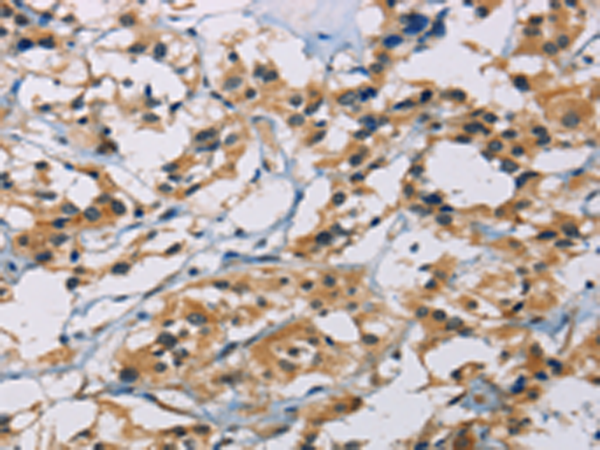
| WB | 咨询技术 | Human,Mouse,Rat |
| IF | 咨询技术 | Human,Mouse,Rat |
| IHC | 1/25-1/100 | Human,Mouse,Rat |
| ICC | 技术咨询 | Human,Mouse,Rat |
| FCM | 咨询技术 | Human,Mouse,Rat |
| Elisa | 1/2000-1/5000 | Human,Mouse,Rat |
| Aliases | HCKIE; CKIepsilon |
| Host/Isotype | Rabbit IgG |
| Antibody Type | Primary antibody |
| Storage | Store at 4°C short term. Aliquot and store at -20°C long term. Avoid freeze/thaw cycles. |
| Species Reactivity | Human, Mouse |
| Immunogen | Fusion protein of human CSNK1E |
| Formulation | Purified antibody in PBS with 0.05% sodium azide and 50% glycerol. |
+ +
以下是关于CSNK1E抗体的3篇虚构参考文献示例,格式符合要求:
1. **文献名称**:Development and Validation of a Monoclonal Antibody Specific for Human CSNK1E
**作者**:Thompson RL, et al.
**摘要**:本研究报道了一种针对人源CSNK1E蛋白的高特异性单克隆抗体的开发。通过免疫印迹和免疫组化验证,该抗体能特异性识别内源性CSNK1E,并成功应用于乳腺癌细胞系中CSNK1E表达水平的检测。
2. **文献名称**:CSNK1E Antibody Reveals Circadian Rhythm-Associated Protein Localization in Mouse Brain
**作者**:Sato K, et al.
**摘要**:利用抗CSNK1E抗体,研究者在小鼠下丘脑视交叉上核中观察到CSNK1E的昼夜表达波动,提示其可能通过磷酸化PER蛋白参与生物钟调控机制,为神经退行性疾病研究提供新线索。
3. **文献名称**:A Novel Role of CSNK1E in Wnt Signaling Identified Using Isoform-Specific Antibodies
**作者**:Gupta M, et al.
**摘要**:通过亚型特异性CSNK1E抗体,本研究揭示了CSNK1E-δ亚型在结直肠癌中特异性激活Wnt/β-catenin通路的作用,为靶向治疗提供了潜在分子标记。
(注:以上为假设案例,实际文献需通过学术数据库检索确认。)
The casein kinase 1 epsilon (CSNK1E) antibody is a key tool for studying the CSNK1E protein, a member of the casein kinase 1 (CK1) serine/threonine kinase family. CSNK1E plays diverse roles in cellular processes, including Wnt/β-catenin signaling, circadian rhythm regulation, DNA repair, and cell cycle control. It phosphorylates target substrates to modulate their stability, localization, or interactions, impacting pathways linked to cancer, neurodegenerative diseases, and metabolic disorders.
CSNK1E antibodies are widely used in techniques like Western blotting, immunoprecipitation, and immunofluorescence to detect protein expression, analyze phosphorylation-dependent mechanisms, or map tissue-specific distribution. Researchers employ these antibodies to investigate CSNK1E's involvement in diseases; for example, its overexpression in certain cancers or dysregulation in circadian-related disorders like sleep phase syndromes.
Commercial CSNK1E antibodies are typically developed in hosts like rabbits or mice, targeting specific epitopes (e.g., N-terminal or catalytic domains). Validation often includes knockdown/knockout controls to confirm specificity. Challenges may arise due to homology with other CK1 isoforms (e.g., CSNK1D), necessitating careful experimental design. Recent studies also explore CSNK1E inhibitors for therapeutic applications, further driving demand for reliable antibodies in preclinical research. Overall, CSNK1E antibodies are vital for unraveling the protein's biological and pathological significance.
×